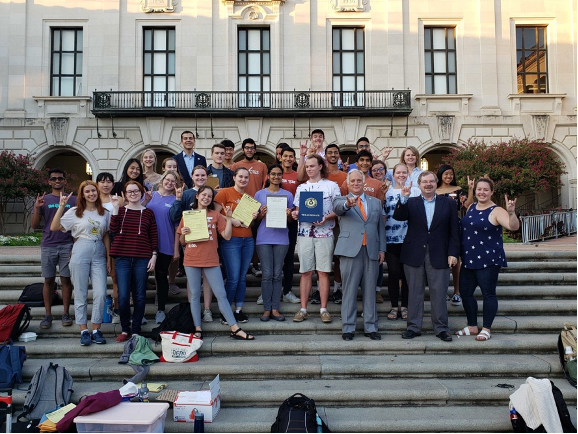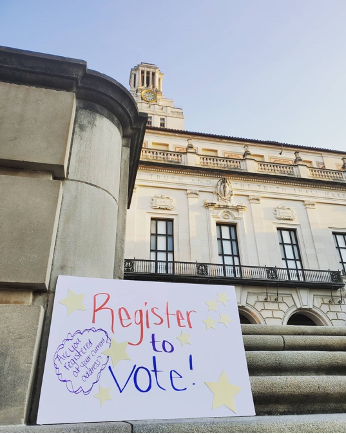How a Volunteer Deputy Registrar Navigates Election during Pandemic.
- Gabrielle Wong
- Nov 18, 2020
- 3 min read
As the pandemic put everything on hold, Kassie Phebillo wondered when she would be able to get back to registering students to vote. The University of Texas graduate student is immune-compromised and knew COVID-19 would be far more deadly for her than her peers.
"Should I risk my life to register people to vote or make everyone's life harder?" she thought.
The pandemic forced Phebillo, 30, to downsize her 10,000 registered voter goal to merely 1,000 because she has asthma. On Oct. 5, the last day to register to vote in Texas, she returned to campus. Even with a down-size goal, Phebillo could not reach it due to the low number of students on campus.
Phebillo has broken multiple records as a volunteer deputy registrar, with thousands of voters registered. She trained over 10,000 new volunteer registrar and educated voters about the simplicity of voting. Phebillo is currently working on her dissertation about teaching during current events and political discussions in college classrooms.
Phebillo was 17 when she received a unique opportunity to cover school board meetings, county commissioners, and town council meetings for her high school newspaper. She attended more than 20 school board meetings, and each of them shaped her career and ambition.
"I got to know these people on a personal level, and sometimes these people are awful, but I can vote against them. So, I went home and voted because I wanted to vote against a specific county commissioner," Phebillo said.
As a high school student, Phebillo was invested in local politics because local official's decisions impacted the community around her. Today, she still believes local elections influence communities more prominently than ever.
"For a long time, I genuinely did not care about national politics. But I see exactly how these [local] folks are influencing my community," Phebillo said.
Phebillo came from Indiana to Texas to join the University of Texas as a graduate student. As a way to adjust to her new environment, she became a volunteer deputy registrar.
"I'm not from Texas, so this is all new and different to me. In the way that it works Indiana is very different. And I learned pretty quickly how important that role is," Phebillo said.
In 2016, Phebillo became the second person to register over a thousand voters in Travis County history. Her work didn't go unnoticed. She was offered a position as a volunteer trainer in hopes of having more student volunteer deputy. She used the opportunity to push for more student volunteer deputy and help students engage in politics early in their lives.
Phebillo has always loved the idea of "voting made easy" because she believes people who don't have a positive experience voting will become less likely to go to the polls. She realized this idea is more important than ever in 2020, especially with the rapid spread of misinformation, the pandemic and the constant rule changes, such as Gov. Greg Abbott's order to limit ballot drop-off locations.
Many volunteers face the obstacle of educating why voters about their voices. Phebillo helps student volunteer deputy on how to engage in these conversations. She suggests volunteer deputy to start the conversation by asking what are the things that annoy them in their daily lives or the issues that matters to them. Then, she would recommend shaping the conversation around local elections and push the importance of their voices in the race.
"In that election, your voice matters a lot because it's a small election, it's not based on any district lines or anything," Phebillo said.
For the upcoming election, she recommends other volunteers to push the message of voting on Sundays because the data shows Sundays are when people are less likely to turn out to vote.
"The voter turnout graph for Travis County always looks like a Longhorn because you have that dip in the middle because Sundays are always in the middle," Phebillo said.
Phebillo is unsure how this election will shape the country's political environment, but her main concern is the political divide between those who are politically active and those who are not.
She believes when campus provides easy access for people to vote, it helps to embed voting as part of their daily processes. However, she thinks many people are upset with the way the coronavirus pandemic has been handled and how it may affect voting.
"I think something to remember is that in 2016, at UT, we saw an increase of almost 15 percent turnout. Though I'm not sure if we'll see an increase or not this year because of everything," Phebillo said.
If people are confused and frustrated about the national elections, Phebillo recommends they should start local because it influences people's lives more prominently.
"Politics has always been messy. I think it was the first thing that people need to acknowledge, but it also influences every moment of our lives,” Phebillo said. “Even if you don't want to vote in the presidential or you want to vote third party in the presidential race, please make sure you're watching local.”




Comments